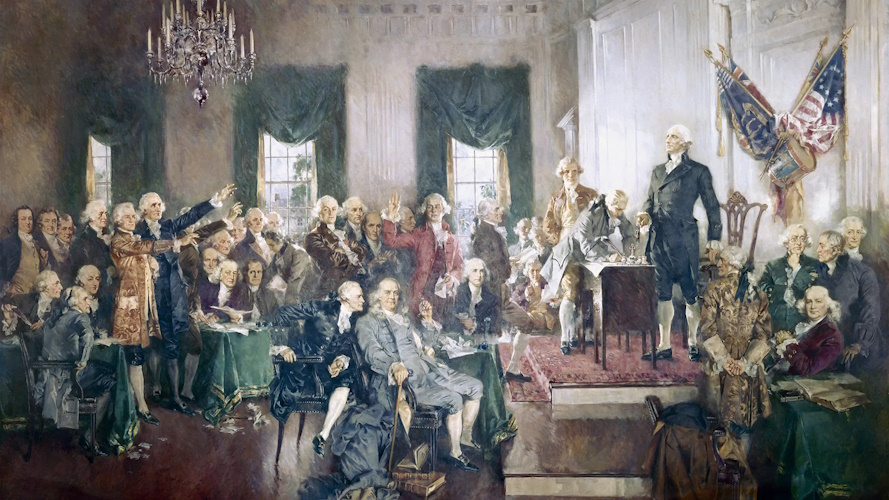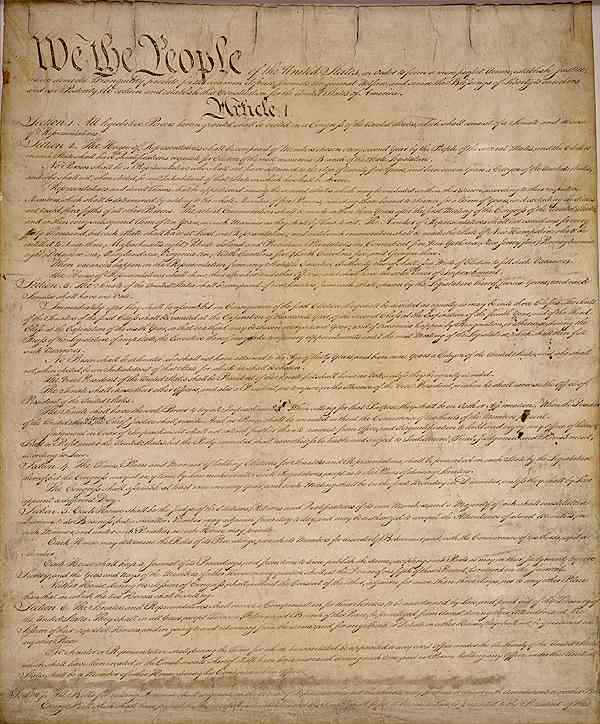
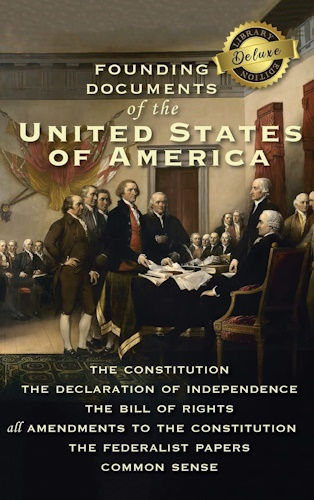
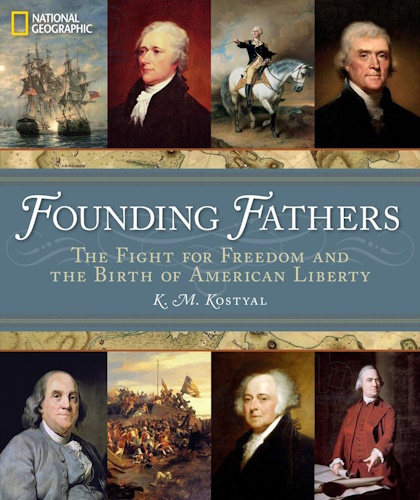
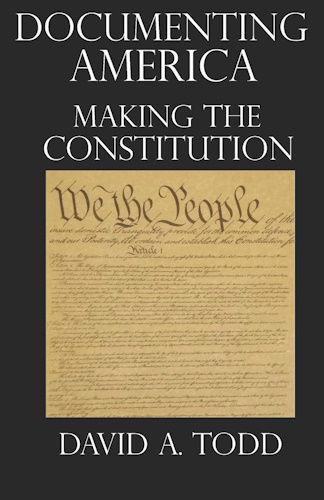


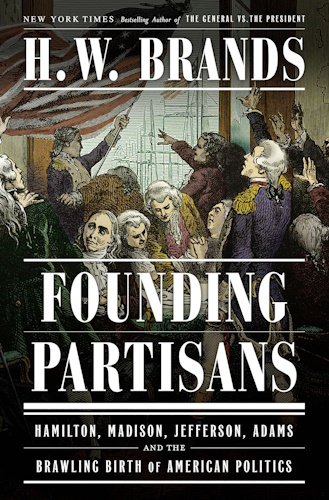
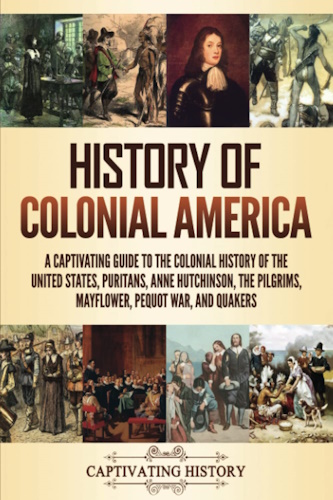
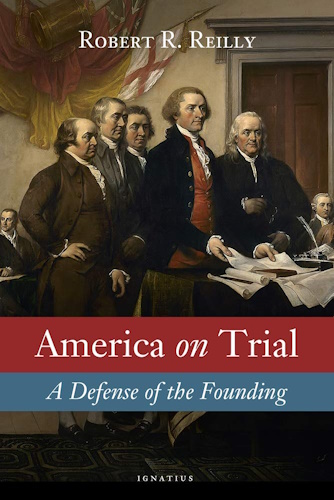
The Constitution For The United States
Its Sources and Its Application
by Thomas James Norton
(Retrieved from archive.org)
The research, work, and dedication
Of
Barefoot Bob Hardison
August 8th, 1933 - January 31st, 2009
![]()
The Constitution For The United States
Its Sources and Its Application
Contents
Preamble
Article 1
Article 2
Article 3
Article 4
Article 5
Article 6
Article 7
Ratification
First 12 Amendment Proposals
"Bill of Rights" Amend. I - X
Amend. XI -XXVII
Missing Original 13th Amendment
Letter of Transmittal
Landmark Court - Case Index
Constitution History
A Quiz for Loyal Americans
Index
A Quiz for All Loyal Americans
on The Constitution For The United States
This quiz was published with the book "The Constitution For The United States" as presented to the Junior and Senior Students of High Schools across the Nation from the 1930s through the 1960s.
Can You Answer These Questions?
QUIZ FOR AMERICANS
Finding for yourself the answers to the Quiz Questions in this site, you will discover -- if you do not already know -- the principles which have made possible the American Way of Life, with its incomparable advantages and achievements.
Here is a facinating pastime as well as the most profitable of quizzes -- for this quiz offers a GRAND PRIZE TO EVERY CONTESTANT. It offers you sound knowledge and appreciation of The Fundamentals of Liberty -- The Most Precious of Possessions. You will discover "The Mainspring of ALL Human Progress" -- The Human Being's God-Given Inherent and Inalienable Right to Liberty Itself!!!
Human energy cannot operate effectively except when men are free to act and be responsible for their actions. But liberty does not mean license; for no one, not government, not anyone, has a right to infringe upon the rights of others.
Whoever lacks that knowledge lacks the weapon to defend his own rights and the rights of others.
QUIZ FOR AMERICANS
Here are 95 Quiz Questions together with "answer reference list." Numbers in ( ) after each question refer to pages in the Norton Book presented at this site and each are hypertext links.
I. On Form or Plan of Government
1. What is a form or plan of government for -- what is it intended to accomplish? (7)
2. Where does the power to set up a form of government reside? Quote President Monroe on that. (1)
3. How did Judge Cooley define a Republican form of government? (166)
4. What did the Supreme Court of the United States say on the Republican form of government? (168)
5. Of what form is the government of the United States? Of each of the States? (166)
6. What did Washington say about our need for an enlightened public opinion. (vii)
7. State what nations adopted our Constitution in whole or in part. (ix)
8. Give Bryce's definition of a "rigid" Constitution. (ix)
9. What is the most remarkable example of that form? (ix)
10. How is a rigid constitution altered or improved? (ix), (170)
II. On the Separation of the Powers of Government
11. Give the classical statement of the American theory of the need for the separation of the three inherent powers of government. (x)
12. When and where was it written? (x)
13. Quote Jefferson on the necessity of putting constitutional chains on the mischievous man in power. (viii)
14. Did the writers of the Constitution fear groups and parties in power as well as men? Quote Madison on this. (viii)
15. What three grand divisions of National power does the Constitution make? (8), (99), (131)
16. Quote President Monroe on the most important of the three divisions. (8)
17. What did Hamilton say on the relative power of the three divisions of the National Government? (137)
18. What powers were reserved by the People to themselves? (225)
19. What powers did the States withold from the National Government and what did the Supreme Court say respecting these reserved powers? (226-227)
20. What demand was made for a Bill of Rights against the National Government, and why? (194 - 197)
III. On the Place and Powers of the States
21. Quote the Supreme Court on the sovereign powers of the States which they possessed before the adoption of the Constitution and with which they did not part by that instrument. (226)
22. What sovereign powers of the States were surrendered by them to the Nation? (90), (91), (96)
23. What did Jefferson say about home rule by the states and against the eventual transfer of all the offices to Washington? (226)
24. Is it the State or the Nation that has power (known as the police power) "to guard the public morals, the public safety, and the public health, as well as to promote the public convenience and the common good? (227)
25. What protection does the Nation guarantee to the States? (227)
26. What contribution of material and thought did the States make to the writers of the Constitution in the Convention at Philadelphia? (x)
IV. On the Legislative Department (the Congress)
27. Is there any law-making power outside of Congress? Quote words to sustain your answer. (8)
28. How does a bill introduced by a member of the Senate or of the House of Representatives become a law? (38)
29. How many powers does the Constitution confer on Congress? (43 - 79)
30. What powers are forbidden to Congress by the People in their Constitution? (82 - 89), (197 - 226)
31. What law is superior to a law enacted by Congress, and when? (176)
V. On the Executive Department (the President)
32. Is there any executive power outside the President? Quote words to sustain your answer. (99)
33. Has the President power respecting legislation? (38)
34. Enumerate the powers conferred by the Constitution on the President. (110 - 126)
35. When may the Vice-President succeed the President? (107)
36. Quote the Supreme Court on the President's inability to make laws. (129)
37. What difference do you find between the oath prescribed in the Constitution for the President and that required from the other officers of the Nation and those of the States? (110), (170 - 181)
38. Quote what Jefferson said on the tyranny which the Executive would exercise in the remote future. (196)
VI. On the Judicial Department (the Courts)
39. Where does the Constitution place the Judicial (law interpreting) power? (131)
40. Is the Constitution itself a law which it is the duty of the courts to uphold and enforce as they do all other laws? (176) And what officers are bound by oath to support it? (110), (179 - 181), (181)
41. Give the gist of what Hamilton said in the Federalist on the function of the Courts when an inferior law conflicts with a superior law. (130)
42. Compare that with what Chief Justice Marshall later said on the same subject. (xv)
43. Name the subject to which the Judicial extends and applies. (136 -144)
44. What incomparable virtue did Professor Dicey of Oxford University find in the system of Constitutional courts invented by the Founders of Our Republic? (180)
45. State briefly what the historian John Fiske wrote of the importance of the Judiciary, and of the influence it had in the establishment of the Republic. (131)
46. What did Hamilton say on the relative powers of the three Departments of the National Government and the necessity of protecting the Judicial Department from attacks by the Legislative Department and the Executive? (137 -138)
VII. On the Bill of Rights
47. What provisions in the Constitution as originally drawn and submitted to the States for ratification are of the nature of the Bill of Rights? (196)
48. On what fears were additional provisions demanded restraining the National Government, and where were the demands expressed? (194)
49. What did jefferson write to Madison on the need for a Bill of Rights? (196)
50. Quote the first five words of the Bill of Rights which was added to the original Constitution. (197)
51. How many articles in the Bill of Rights, and against what government (National or State) are their prohibitions directed? (227)
52. What similar Declarations of Right had the American colonists made against the King and the Parliament of England? (195)
53. Had the English people ever made Declarations of Right against the tyrannies of their government at home? (195)
54. Name five liberties of the American protected by the first ten amendments to the Constitution from tyrannical action by the Government of the United States. (197 - 226)
VIII. On Declaring and Waging War
55. To what department of the National Government do the people, by their Constitution, commit the power of declaring and conducting war? (70)
56. What Department is empowered to raise and support armies? Is there any limitation on this power? (73 - 74)
57. Who is commander of the Army and the Navy during war? (110)
58. What limitation does the Constitution fix to prevent Ambition and Vanity from marching to glory? (73)
59. Quote what Alexander Hamilton said in the Federalist on this restriction respecting war-making. (74)
60. What device is employed in England to keep the army down in numbers and in control? (73)
61. Was the power to declare war conferred for "the purpose of aggression or agrandizement?" (71)
62. How must the United States acquire territory when it needs it? (71 - 72)
63. What weekness in the Articles of Confederation, our first constitutional frame of government, were found respecting the conduct of war? (75)
64. Why, in your opinion, was Section 8 of Article 1 of the Constitution, near its close, made to reserve to the States the power to appoint the officers of the militia (State military forces) and the authority to train those troops? (77)
65. Why, do you believe, did the conventions in the States which ratified the Constitution regard that provision as insufficient and insist upon the addition of the Second Amendment or Article II of the Bill of Rights? (206)
66. Watch whether this constitutional militia of the people and the States is -- without an amendment to the Constitution -- being put out of existence by act of Congress establishing a national conscript army. (206)
67. For what purposes only may Congress call into the service of the Nation the militia of the States? (76)
68. One man declared the World War I in 1914. At least how many men must participate in a declaration of war by the United States against another nation? Explain how you reach your conclusion. (26), (71)
69. How many men did the United States enroll for World War I? How many went into service in France? How many were in combat at the front? (75 -76)
IX. On the Writers of the Constitution
70. How many of the thirteen States sent delegates to the Constitutional Convention at Philadelphia? (xiv)
71. By what authority did the delegates sign the Constitution which they drafted? (188)
72. What did they mean by writing in the Preamble "a more perfect Union," and what did Washington say on this in his Farewell Address? (2)
73. When they wrote in the Preamble "We the people of the United States," did they mean all the people in one mass, or did they refer to the peoples of the several States united? Do the people of the United States act as one body or as States? (1)
74. What plans for a Constitution were brought into the Convention by delegates? (xi)
75. What scholarship was in the Convention and what did Edmund Burke say in the English House of Commons of the legal learning of the Americans? (xi)
76. Tell of the educational advantages offered by the country at that time. (xii)
77. How long did the delegates to the Convention labor at their task? (190)
78. Who presided over their deliberations? (xiv), (186)
79. Quote President Monroe on the importance of their achievements. (186)
80. What two members of the Convention helped in writing the Federalist papers (now know in book form as "The Federalist") addressed in explanation of the document to the people of New York to persuade them to require ratification? (187)
81. How many papers were so published? (188)
82. Into how many languages were they translated? (188)
83. How many delegates did the States choose to go to the Constitutional Convention? (188)
84. How many went? How many were present at the signing? (188 - 189)
85. Of those present how many and who refused to sign? (188 - 189)
86. Why did they refuse? (188 - 189)
IX. On Taxation and the Limitation Thereof
87. In which of the three Departments of the National Government is the power to tax vested by the people through their Constitution? (43)
88. Name the purposes for which taxes may be levied and collected. (45)
89. Does the specification of those purposes prevent taxation for other purposes? (45)
90. Were objections raised in the ratifying conventions of the States that the words "general welfare" would permit unlimited taxation; and what was Madison's answer to this in "The Federalist"? (45)
91. How many paragraphs granting power to Congress in section 8 of Article I? (43 - 79)
92. Quote President Jackson on the menace of appropriations of money by Congress for local advantage in the States. (45)
93. Name some other Presidents who vetoed such appropriations. (46)
94. What meaning did the Supreme Court give in 1935 to the words "general welfare"? (45) (For in-depth research see http://www.ssa.gov/history/court.html)
95. What did President Harding say about the nature of a just government and why? (45)
Our Constitution is the best plan ever made to assure the freedom and to release the creative powers of men. The guarantees of life, liberty and property made possible the American Way of Life. It has stimulated more new enterprise and invention, and has given to the people of this nation a higher standard of living, better housing, more food, greater freedom in their civil, religious and personal lives than any other people in history have enjoyed.
Our Constitution is a landmark in the age-long struggle for the Liberty of the Individual, The Mainspring of All Human Progress. In it are guaranteed all the freedoms. It is your shield and armor so long as its provisions prevail and so long as the majority of our people sustain them in their original strength and significance.
You may decide, as have other loyal Americans, that you would like to arouse in others the reverence you feel for this great document which underlies all our liberties. If so, and you wish to see that copies get into other hands, you can buy a CD with the complete files on this site to study off-line and to give as gifts to other loyal Americans -- Send an email below to inquire.
[Bob Hardison passed in 2009 and so did his e-mail. I don't know if the CD is anywhere available or not, but don't hesitate to recommend this exceptional Constitution For the United States learning series that I've resurrected to teach us, once again, that Americans literally OWN everything in, on, and above our Union of States and territories. Every inch of land, drop of water, blade of grass, pinch of salt, and breath of air. Americans! NOT "U.S. Citizens," NOT "citizens of the United States," and NOT this new class of 'citizen' called "citizen of the United States of America." Americans!!
The 'Constitutions', all three (3) of them, (1) American subcontractor - dba "States of America" (a Federal Republic) 1787, (2) British Territorial subcontractor - dba "United States of America" (a Democracy) 1789, and (3) Municipal subcontractor - dba "United States" (a Papal Plenary Theocracy) 1790, are service contracts between the People and the subcontractors. Don't forget that, they are the hired help, the People are the boss. ~GBA]
![]()
![]()
![]()
Disclaimer:
Some material presented will contain links, quotes, ideologies, etc., the contents of which should be understood to first, in their whole, reflect the views or opinions of their editors, and second, are used in my personal research as "fair use" sources only, and not espousement one way or the other. Researching for 'truth' leads one all over the place...a piece here, a piece there. As a researcher, I hunt, gather and disassemble resources, trying to put all the pieces into a coherent and logical whole. I encourage you to do the same. And please remember, these pages are only my effort to collect all the pieces I can find and see if they properly fit into the 'reality aggregate'.
Personal Position:
I've come to realize that 'truth' boils down to what we 'believe' the facts we've gathered point to. We only 'know' what we've 'experienced' firsthand. Everything else - what we read, what we watch, what we hear - is what someone else's gathered facts point to and 'they' 'believe' is 'truth', so that 'truth' seems to change in direct proportion to newly gathered facts divided by applied plausibility. Though I believe there is 'truth', until someone representing the celestial realm visibly appears and presents the heavenly records of Facts And Lies In The Order They Happened, I can't know for sure exactly what "the whole truth' on any given subject is, and what applies to me applies to everyone. Until then I'll continue to ask, "what does The Urantia Book say on the subject?"
~Gail Bird Allen
![]()
![]()








-
Urantia Book, 44:0.11 - The Celestial Artisans
Never in your long ascendancy will you lose the power to recognize your associates of former existences. Always, as you ascend inward in the scale of life, will you retain the ability to recognize and fraternize with the fellow beings of your previous and lower levels of experience. Each new translation or resurrection will add one more group of spirit beings to your vision range without in the least depriving you of the ability to recognize your friends and fellows of former estates.
-
Princess Bride 1987 Wallace Shawn (Vizzini) and Mandy Patinkin (Inigo Montoya)
Vizzini: HE DIDN'T FALL? INCONCEIVABLE.
Inigo Montoya: You keep using that word. I do not think it means what you think it means. -
Urantia Book, 117:4.14 - The Finite God
And here is mystery: The more closely man approaches God through love, the greater the reality -- actuality -- of that man. The more man withdraws from God, the more nearly he approaches nonreality -- cessation of existence. When man consecrates his will to the doing of the Father's will, when man gives God all that he has, then does God make that man more than he is.
-
Urantia Book, 167:7.4 - The Talk About Angels
"And do you not remember that I said to you once before that, if you had your spiritual eyes anointed, you would then see the heavens opened and behold the angels of God ascending and descending? It is by the ministry of the angels that one world may be kept in touch with other worlds, for have I not repeatedly told you that I have other sheep not of this fold?"
-
Urantia Book, Foreword - 0:12.12 - The Trinities
But we know that there dwells within the human mind a fragment of God, and that there sojourns with the human soul the Spirit of Truth; and we further know that these spirit forces conspire to enable material man to grasp the reality of spiritual values and to comprehend the philosophy of universe meanings. But even more certainly we know that these spirits of the Divine Presence are able to assist man in the spiritual appropriation of all truth contributory to the enhancement of the ever-progressing reality of personal religious experience—God-consciousness.
-
Urantia Book, 1:4.3 - The Mystery Of God
When you are through down here, when your course has been run in temporary form on earth, when your trial trip in the flesh is finished, when the dust that composes the mortal tabernacle "returns to the earth whence it came"; then, it is revealed, the indwelling "Spirit shall return to God who gave it." There sojourns within each moral being of this planet a fragment of God, a part and parcel of divinity. It is not yet yours by right of possession, but it is designedly intended to be one with you if you survive the mortal existence.
-
Urantia Book, 1:4.1 - The Mystery Of God
And the greatest of all the unfathomable mysteries of God is the phenomenon of the divine indwelling of mortal minds. The manner in which the Universal Father sojourns with the creatures of time is the most profound of all universe mysteries; the divine presence in the mind of man is the mystery of mysteries.
-
Urantia Book, 1:4.6 - The Mystery Of God
To every spirit being and to every mortal creature in every sphere and on every world of the universe of universes, the Universal Father reveals all of his gracious and divine self that can be discerned or comprehended by such spirit beings and by such mortal creatures. God is no respecter of persons, either spiritual or material. The divine presence which any child of the universe enjoys at any given moment is limited only by the capacity of such a creature to receive and to discern the spirit actualities of the supermaterial world.
-
Urantia Book, 11:0.1 - The Eternal Isle Of Paradise
Paradise is the eternal center of the universe of universes and the abiding place of the Universal Father, the Eternal Son, the Infinite Spirit, and their divine co-ordinates and associates. This central Isle is the most gigantic organized body of cosmic reality in all the master universe. Paradise is a material sphere as well as a spiritual abode. All of the intelligent creation of the Universal Father is domiciled on material abodes; hence must the absolute controlling center also be material, literal. And again it should be reiterated that spirit things and spiritual beings are real.
-
Urantia Book, 50:6.4 - Planetary Culture
Culture presupposes quality of mind; culture cannot be enhanced unless mind is elevated. Superior intellect will seek a noble culture and find some way to attain such a goal. Inferior minds will spurn the highest culture even when presented to them ready-made.
-
Urantia Book, 54:1.6 - True And False Liberty
True liberty is the associate of genuine self-respect; false liberty is the consort of self-admiration. True liberty is the fruit of self-control; false liberty, the assumption of self-assertion. Self-control leads to altruistic service; self-admiration tends towards the exploitation of others for the selfish aggrandizement of such a mistaken individual as is willing to sacrifice righteous attainment for the sake of possessing unjust power over his fellow beings.
-
Urantia Book, 54:1.9 - True And False Liberty
How dare the self-willed creature encroach upon the rights of his fellows in the name of personal liberty when the Supreme Rulers of the universe stand back in merciful respect for these prerogatives of will and potentials of personality! No being, in the exercise of his supposed personal liberty, has a right to deprive any other being of those privileges of existence conferred by the Creators and duly respected by all their loyal associates, subordinates, and subjects.
-
Urantia Book, 54:1.8 - True And False Liberty
There is no error greater than that species of self-deception which leads intelligent beings to crave the exercise of power over other beings for the purpose of depriving these persons of their natural liberties. The golden rule of human fairness cries out against all such fraud, unfairness, selfishness, and unrighteousness.

